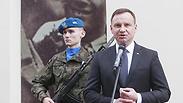
Polish president: No room for anti-Semitism or racism in Poland today
Speaking at a commemoration of the 70th anniversary of a massacre of Jews after World War II, Andrzej Duda, though aligned with the right-wing governing party insisted, 'There is no room for any form of prejudice.'
President Andrzej Duda spoke in Kielce, where communist police and a mob killed around 40 Jews and several other people on July 4, 1946. Coming a year after the end of World War II, the killings sent fear through Poland's Jewish community and sparked a wave of Jewish emigration from Poland.
"In a free, sovereign and independent Poland there is no room for any form of prejudice. There is no room for racism, for xenophobia, for anti-Semitism," Duda said in a speech in front of the building at 7 Planty Street, where the killings took place.
Duda and other leaders with the governing right-wing Law and Justice party, which Duda is allied with, have sent mixed messages on matters of prejudice since the election last year that brought them to power.
The party has taken a staunchly anti-migrant stance, with party leader Jaroslaw Kaczynski accusing refugees during the election campaign last year of carrying "parasites and protozoa" to Europe.
Duda himself won the presidency after a remark in a debate that seemed aimed at winning the support of anti-Semitic voters.
In recent months, however, Duda, whose wife has Jewish ancestry, has strongly condemned anti-Semitism and xenophobia several times. Kaczynski also condemned anti-Semitism during a recent commemoration in Bialystok remembering the burning of a synagogue by the Germans during the Holocaust.
The massacre in Kielce occurred when townspeople and communist-era police attacked the Jews of Kielce with guns and clubs little more than a year after the defeat of Nazi Germany.
The mob killed 42 people, mostly Jews, while about 30 more were killed in a violent frenzy that spread across the area. The massacre was a huge blow to the estimated 250,000 Jewish Holocaust survivors — those left from a prewar Jewish population of nearly 3.5 million — leading many to feel unsafe in their homeland.
The violence broke out after a false report spread that a Christian boy had been kidnapped by Jews living at 7 Planty St. The perpetrators faced trials. Nine people were executed and others were given prison sentences.










.jpg)
.jpg)
